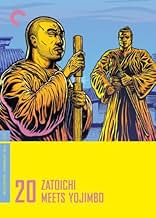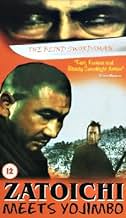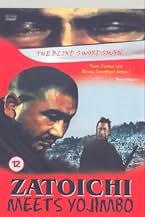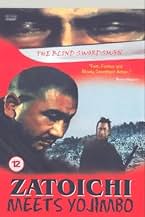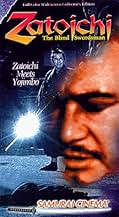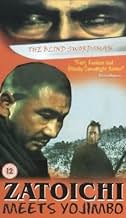Agrega una trama en tu idiomaZatoichi tries to unrest the mob rule over a small village all while the gang leader's bodyguard is actually the Yojimbo, secretly taking the gang down from the inside. Will the two heroes r... Leer todoZatoichi tries to unrest the mob rule over a small village all while the gang leader's bodyguard is actually the Yojimbo, secretly taking the gang down from the inside. Will the two heroes realize in time that they are on the same side?Zatoichi tries to unrest the mob rule over a small village all while the gang leader's bodyguard is actually the Yojimbo, secretly taking the gang down from the inside. Will the two heroes realize in time that they are on the same side?
- Dirección
- Guionistas
- Elenco
Masakane Yonekura
- Boss Masagoro
- (as Sakatoshi Masakane)
Shigeru Kôyama
- Jinzaburo Wakiya
- (as Shigeru Kamiyama)
Fujio Tokita
- Blacksmith Tomeyoshi
- (as Fujio Tsuneda)
- Dirección
- Guionistas
- Todo el elenco y el equipo
- Producción, taquilla y más en IMDbPro
Opiniones destacadas
Zatoichi Meets Yojimbo was good as a throwaway movie-of-the-night to watch with friends (friends who were into Zatoichi and old samurai movies), but in the sense of it being something worthy of its stature, it didn't quite deliver. An issue, as some reviewers as well as author Stuart Galbraith (Emperor and the Wolf), was Toshrio Mifune wasn't playing the character really as he was in the Kurosawa films.
In the original Yojimbo and Sanjuro, Mifune crafted a true anti-hero bad-mutha samurai, who was grungy with his scratches, but also very cunning in how he could play both sides or act a little uncouth in his manipulations. Here, one just sees him acting like a stumbling drunk, and even a little like a scummy caricature of Yojimbo. Truth be told, it's meant more for Zatoichi fans- he was a HUGE title character, as played by its star Shintaro Katsu.
The problem there as well is that there have been better Zatoichi movies (I haven't even seen many, but the few I've seen, and as repetitive as they can get, aren't shoehorned plot-wise like so). And this isn't totally to put the movie down, as a cash-in flick it does attempt at making some entertaining segments (and I do like how the two of them decide at first to combine forces, so to speak).
It's entertaining enough, but should be more memorable, as other franchises can get more creative or try different ideas with their stars when trying to combine their vehicle-makers - although if you have come this far anyway with Zatoichi, why stop now. It's even sort of lackadaisically shot and edited, in a very formulaic manner.
In the original Yojimbo and Sanjuro, Mifune crafted a true anti-hero bad-mutha samurai, who was grungy with his scratches, but also very cunning in how he could play both sides or act a little uncouth in his manipulations. Here, one just sees him acting like a stumbling drunk, and even a little like a scummy caricature of Yojimbo. Truth be told, it's meant more for Zatoichi fans- he was a HUGE title character, as played by its star Shintaro Katsu.
The problem there as well is that there have been better Zatoichi movies (I haven't even seen many, but the few I've seen, and as repetitive as they can get, aren't shoehorned plot-wise like so). And this isn't totally to put the movie down, as a cash-in flick it does attempt at making some entertaining segments (and I do like how the two of them decide at first to combine forces, so to speak).
It's entertaining enough, but should be more memorable, as other franchises can get more creative or try different ideas with their stars when trying to combine their vehicle-makers - although if you have come this far anyway with Zatoichi, why stop now. It's even sort of lackadaisically shot and edited, in a very formulaic manner.
I've seen about 7 or 8 zatoichi flicks and both of yojimbos. This is probably the best of zatoichi's films not just because of mifune but the story and craftsmanship of the film as well. The two stars work well together, although the yojimbo character is more p***ed off then the previous two films. I could be wrong but I think we find out who mifune's yojimbo is really working for which would explain why he acts like a scoundrel but in the end serves justice. The movie sports great swordplay and keeps the tradition of both characters
It has taken several viewings of this film to finally come around and enjoy it (for the most part). Toho Studios has now taken over the Zatoichi franchise and this means a larger budget production. Of course Mifune and Katsu together were guaranteed to draw a lot of attention when the film was released in 1970.
Zatoichi is tired of killing and remembers a beautiful, peaceful village up in the mountains. Then he's off to the village to enjoy the plum blossoms and the sound of a babbling brook. Or maybe not! The village is not the same and several bad characters plot to make themselves rich at the expense of the locals (and the Japanese Treasury in this case).
The repertoire between Zatoichi and the Yojimbo (Sasa) is entertaining and funny. Sasa tells Zatoichi to act more like a criminal, and Zatoichi, ever ready to please, pounds down a bottle of sake. The two call each other idiot and freak. At first these are hateful terms, but over the course of the film, they come to respect one another, and continue to use the same names for each other.
This is the longest film in the Zatoichi series (116 minutes) and it needn't be. The first hour works well, but the next 30 minutes or so sees the story meandering along with the introduction of another government spy (turned bad) that adds nothing to the main story.
The sword work in this film is only good, not great. The final confrontation between Zatoichi and Sasa is short and ends as one could predict. This film could have really been a gem if the film concentrated on the development of Zatoichi and Sasa's relationship. The two characters are entertaining and the film will please most chambara aficionados.
Zatoichi is tired of killing and remembers a beautiful, peaceful village up in the mountains. Then he's off to the village to enjoy the plum blossoms and the sound of a babbling brook. Or maybe not! The village is not the same and several bad characters plot to make themselves rich at the expense of the locals (and the Japanese Treasury in this case).
The repertoire between Zatoichi and the Yojimbo (Sasa) is entertaining and funny. Sasa tells Zatoichi to act more like a criminal, and Zatoichi, ever ready to please, pounds down a bottle of sake. The two call each other idiot and freak. At first these are hateful terms, but over the course of the film, they come to respect one another, and continue to use the same names for each other.
This is the longest film in the Zatoichi series (116 minutes) and it needn't be. The first hour works well, but the next 30 minutes or so sees the story meandering along with the introduction of another government spy (turned bad) that adds nothing to the main story.
The sword work in this film is only good, not great. The final confrontation between Zatoichi and Sasa is short and ends as one could predict. This film could have really been a gem if the film concentrated on the development of Zatoichi and Sasa's relationship. The two characters are entertaining and the film will please most chambara aficionados.
This film brings together two of the greatest characters created in Japanese cinema. Zatoichi (Shintaro Katsu) is the blind swordsman who goes back to a village that he remembers as peaceful and tranquil. It has been two to three years since his last visit and he longs to get away from the constant attacks that plague him on a daily basis, as he has a price on his head. But all is not as he remembers. When he arrives to his beloved village, he finds it is torn between a father and son that have their own gangs involved in their own family feud. As a result, the village is torn between the two men as the son seeks his father's gold (which may or may not exist).
As the blind masseur becomes involved in the midst of this feud, the son's hired bodyguard (Toshiro Mifune) is introduced. Mifune ever-so-slightly reprises his role from the Akira Kurosawa films, Yojimbo and Sanjuro. It's not the exact same character, but only the most devout film buffs would see the subtle differences. As the Yojimbo discovers just who Zatoichi is and the price on his head, the two banter back and forth with threats and insults and even a few sword fights as the plot thickens.
The film keeps you guessing until the very end as to whether or not these two samurai masters will end up friends or foes. All the while, Shintaro Katsu and Toshiro Mifune give master performances in their roles as usual. What Toshiro Mifune brings to this long running series of films is a stark contrast to Shintaro Katsu's simple and quiet Zatoichi. Toshiro Mifne's Yojimbo is harsh, loud, and aggressive when comparing the two. Putting these two great actors together, while playing off one another, results in a well balanced and enjoyable opposition. We all know who the hero is but what happens between these two? Do they find resolution or does it all end in a bitter and bloody sword battle? The only way to find out is to watch.
I enjoyed this film immensely. I cannot recommend it enough to fans of Japanese period films, Zatoichi fans, or Toshiro Mifune fans. If any of those appeal to you, then you owe it to yourself to watch this film. You will find nothing but sheer delight in this great masterpiece. This is also a great entry into the Zatoichi films. Even though this is a sequel you will not be lost by starting with this film in the series. This marks the 20th film of the Shintaro Katsu Zatoichi films. It was originally shot in 1965 in color and is in Japanese with the optional English subtitles. The transfer to DVD has been masterfully handled by AnimEigo and the translation is great. I was amazed at how crisp the picture and the sound was for being such an old film. Again I cannot recommend it enough. If you have any inclination to see this movie do not hesitate. I'm sure you will enjoy it as much as I did.
As the blind masseur becomes involved in the midst of this feud, the son's hired bodyguard (Toshiro Mifune) is introduced. Mifune ever-so-slightly reprises his role from the Akira Kurosawa films, Yojimbo and Sanjuro. It's not the exact same character, but only the most devout film buffs would see the subtle differences. As the Yojimbo discovers just who Zatoichi is and the price on his head, the two banter back and forth with threats and insults and even a few sword fights as the plot thickens.
The film keeps you guessing until the very end as to whether or not these two samurai masters will end up friends or foes. All the while, Shintaro Katsu and Toshiro Mifune give master performances in their roles as usual. What Toshiro Mifune brings to this long running series of films is a stark contrast to Shintaro Katsu's simple and quiet Zatoichi. Toshiro Mifne's Yojimbo is harsh, loud, and aggressive when comparing the two. Putting these two great actors together, while playing off one another, results in a well balanced and enjoyable opposition. We all know who the hero is but what happens between these two? Do they find resolution or does it all end in a bitter and bloody sword battle? The only way to find out is to watch.
I enjoyed this film immensely. I cannot recommend it enough to fans of Japanese period films, Zatoichi fans, or Toshiro Mifune fans. If any of those appeal to you, then you owe it to yourself to watch this film. You will find nothing but sheer delight in this great masterpiece. This is also a great entry into the Zatoichi films. Even though this is a sequel you will not be lost by starting with this film in the series. This marks the 20th film of the Shintaro Katsu Zatoichi films. It was originally shot in 1965 in color and is in Japanese with the optional English subtitles. The transfer to DVD has been masterfully handled by AnimEigo and the translation is great. I was amazed at how crisp the picture and the sound was for being such an old film. Again I cannot recommend it enough. If you have any inclination to see this movie do not hesitate. I'm sure you will enjoy it as much as I did.
Zatoichi Meets Yojimbo is the twentieth film in the Japanese franchise about the blind masseur, skilled swordsman and lowly yakuza. Yojimbo's character is inspired by Akira Korusawa's critically acclaimed Yojimbo and even played by famous actor Toshiro Mifune. The movie tells the story how Zatoichi grows tired of having blood on his hands and retires to his peaceful hometown. Upon arriving, he realizes that the town has lost its charm over the past three years. After a terrible drought, the leader of the village seeked the protection of yakuza against people from other villages who were trying to steal reserves. Since then, two bosses are controlling the territory. The delicate thing is that one of them is the wise father and the other one his impulsive son. The former decides to hire Zatoichi as protector while the latter hires Yojimbo as his bodyguard. In addition to the familial and territorial conflict, there are rumors of an important quantity of gold hidden by the older boss for his second son. Zatoichi's and Yojimbo's interests, paths and swords cross multiple times until a dramatic showdown during a storm.
Zatoichi Meets Yojimbo looks great on paper but turns out being the weakest film in the franchise so far. The movie overstays its welcome with a length approaching two hours and especially the middle section is plodding and at times hard to sit through. The sword fights aren't as sepctacular as in several previous movies. The film is filled with boring, repetitive and stereotypical dialogues. The addition of odd comic relief in certain scenes also drags this movie down and makes characters like the younger boss look ridiculous. The plot is a times hard to follow because it focuses on too many characters and side stories at the same time. Yojimbo is a one-dimensional character in this film who is busy swearing, sleeping and drinking. Even the usually sympathetic Zatoichi isn't quite convincing as he aimlessly walks around, occasionally cooperates with dumb thugs and often swears and drinks in his ambiguous relationship with Yojimbo.
There are only very few redeeming qualities in this movie. The poor Japanese village certainly has its exotically rural charm. The viewers get to know a little bit more about Zatoichi's background and past even though this option wasn't exploited enough in my opinion. The story line is more developed than usual but also confusing at times.
To be honest, Zatoichi Meets Yojimbo is the movie in the franchise that I've enjoyed the least so far. The characters are often one-dimdensional, the comic relief doesn't fit in and the plot is plodding. I would neither recommend this film to fans of the brilliant Zatoichi franchise nor to those who loved Korusawa's Yojimbo. Don't get fooled by the seemingly intriguing concept of combining two of Japan's greatest chambara characters. This film doesn't deserve the acclaim and attention it gets.
Zatoichi Meets Yojimbo looks great on paper but turns out being the weakest film in the franchise so far. The movie overstays its welcome with a length approaching two hours and especially the middle section is plodding and at times hard to sit through. The sword fights aren't as sepctacular as in several previous movies. The film is filled with boring, repetitive and stereotypical dialogues. The addition of odd comic relief in certain scenes also drags this movie down and makes characters like the younger boss look ridiculous. The plot is a times hard to follow because it focuses on too many characters and side stories at the same time. Yojimbo is a one-dimensional character in this film who is busy swearing, sleeping and drinking. Even the usually sympathetic Zatoichi isn't quite convincing as he aimlessly walks around, occasionally cooperates with dumb thugs and often swears and drinks in his ambiguous relationship with Yojimbo.
There are only very few redeeming qualities in this movie. The poor Japanese village certainly has its exotically rural charm. The viewers get to know a little bit more about Zatoichi's background and past even though this option wasn't exploited enough in my opinion. The story line is more developed than usual but also confusing at times.
To be honest, Zatoichi Meets Yojimbo is the movie in the franchise that I've enjoyed the least so far. The characters are often one-dimdensional, the comic relief doesn't fit in and the plot is plodding. I would neither recommend this film to fans of the brilliant Zatoichi franchise nor to those who loved Korusawa's Yojimbo. Don't get fooled by the seemingly intriguing concept of combining two of Japan's greatest chambara characters. This film doesn't deserve the acclaim and attention it gets.
¿Sabías que…?
- TriviaThis film was so popular that in the U.S. is was booked into some theaters that normally didn't run foreign language films.
- ConexionesFollowed by Zatôichi abare-himatsuri (1970)
Selecciones populares
Inicia sesión para calificar y agrega a la lista de videos para obtener recomendaciones personalizadas
- How long is Zatoichi Meets Yojimbo?Con tecnología de Alexa
Detalles
- Fecha de lanzamiento
- País de origen
- Idioma
- También se conoce como
- Zatoichi Meets Yojimbo
- Productoras
- Ver más créditos de la compañía en IMDbPro
- Tiempo de ejecución1 hora 55 minutos
- Relación de aspecto
- 2.35 : 1
Contribuir a esta página
Sugiere una edición o agrega el contenido que falta

Principales brechas de datos
By what name was Zatôichi to yôjinbô (1970) officially released in India in English?
Responda

